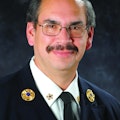Judging by the headlines on this page, it seems like no city or town in the U.S. is safe from money trouble. People in the private sector have been and continue to be laid off by the tens of thousands. The fire service is another group that apparently is a sacrificial lamb. When budget directors, mayors and councils want to save money, who is getting laid off, browned out, fire companies closed, staff decreased, civilian positions eliminated? The fire service. Who is suffering, besides the firefighters and their families? The public they are supposed to serve. The result? Increased response times, inadequate manpower on the first alarm, bad feelings and hostility.
During the nation's bicentennial in 1976, a contest involved firehouse apparatus doors with paintings depicting patriotic scenes. There was an old firehouse in Brooklyn, NY, for Engine 206 before they moved to a new location. The front door of Engine 206 had a painting of three Revolutionary War soldiers with a fife, drum and American flag. The saying above the painting was "200 Years and Still Minutemen." Despite reduced tax revenues, some politicians think it is OK for firefighters to arrive a little later and travel a little farther with fewer personnel. My first borough administrator said you can never decrease your response time as a volunteer department. We've been preaching that seconds count in a fire since Ben Franklin, but apparently today that doesn't matter anymore.
The politicians have altered the physics of fire. It is tough to say, but I hope it isn't their house we are responding to or their car accident or their heart attack. That would be a different story. People are going to get hurt and it is bound to happen somewhere across the country that a firefighter will lose his or her life because of stress or overwork resulting from the increased workload.
For all the programs the National Fallen Firefighters Foundation has instituted in trying to reduce firefighter deaths, this budget crisis has set the fire service back years. It may never recover. The way some of these municipalities run their finances, if these cities and towns were like you and me, many of them would be out of business. Where is all the money the stimulus package was supposed to provide? We hear that only a portion has been allotted so far. Keep giving billions to foreign countries, many of which mess with us all the time? How about providing the right amount of funds for what is truly needed in the U.S.? Show me the money.
A horrific train wreck in Washington, DC, recently was similar to a freight train-commuter train accident in Los Angeles last year. A very tough and exhausting rescue and recovery effort was needed in both incidents. You can read about the time and great effort it took DC-area first responders to search, extricate, remove and triage the passengers. The story by District of Columbia Fire Chief Dennis Rubin may be found on page 52.
A massive fire involved a Houston furniture warehouse with features similar to those found at the sofa store fire in Charleston, SC, in 2007 that claimed the lives of nine firefighters. Both fires involved large displays and extensive storage, but the Houston fire was of such magnitude that it went to a defensive attack right away. See page 90 to learn how firefighters were able to keep the fire from spreading through the entire complex.
Also this month, we present the third installment of the National Run Survey. Tabulated by Kevin Roche and Elizabeth Neroulas, the survey reports on the busiest chiefs, stations, hazmat units, ambulances and EMS non-transport units.
For comments, ideas and suggestions, please contact us at [email protected].
About the Author

Harvey Eisner
Editor Emeritus
HARVEY EISNER was named Editor Emeritus of Firehouse® after serving 15 years as Firehouse's Editor-in-Chief. He joined the Tenafly, NJ, Fire Department in 1975 and served as chief of department for 12 years. He was a firefighter in the Stillwater, OK, Fire Department for three years while attending Oklahoma State University. Eisner was an honorary assistant chief of the FDNY and program director for the Firehouse Expo, Firehouse World and Firehouse Central conferences. He covered many major fires and disasters and interviewed numerous fire service leaders for Firehouse®